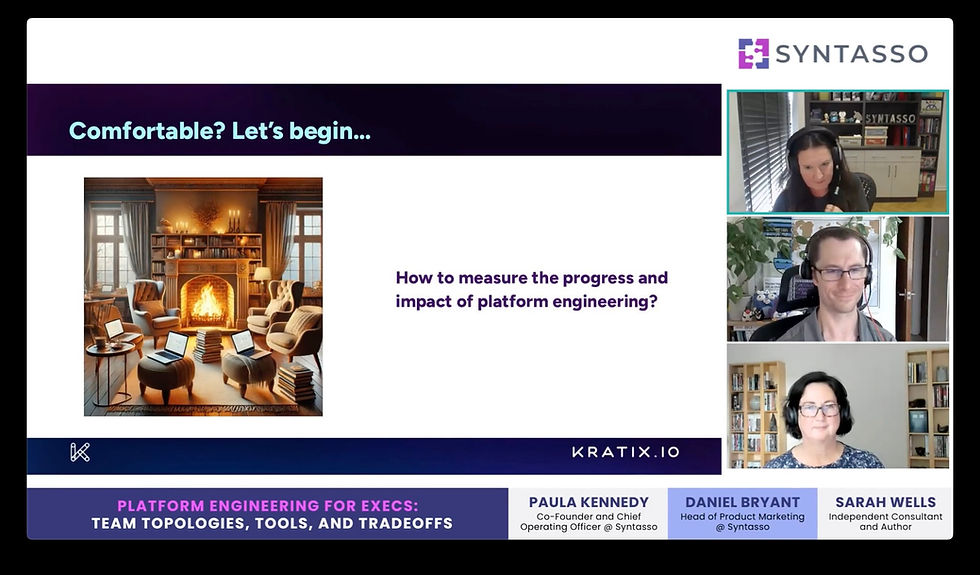Platform Engineering for Execs: Team Topologies, Tools & Trade-offs (Webinar Recap)
- Daniel Bryant

- Aug 21, 2024
- 3 min read
In our recent webinar, "Platform Engineering for Execs: Team Topologies, Tools, and Trade-offs," industry luminaries Sarah Wells and Paula Kennedy joined host Daniel Bryant for an interesting discussion on the strategic implications of platform engineering.
The 30-minute dialogue explored the pivotal role of leadership in enabling app development teams to accelerate delivery, mitigate risks, and scale effectively.
You can download the slides via the Syntasso Speaker Deck and watch the webinar recording via LinkedIn or the YouTube embedding at the end of the article.

The role of platforms (as a product)
The session started with Daniel emphasising the increasing expectations for executives to “do more with less”. He laid out the premise that platform strategies, if led and managed correctly, could provide the needed leverage.
The rest of the discussion covered the vital role of platforms, with the consensus being that they allow development teams to focus more on delivering value and less on managing infrastructure complexities.
Sarah particularly stressed viewing “platforms as products” that serve internal customers—the development teams—ensuring they are user-friendly and genuinely solve the teams' problems.
Platform adoption and integration
As the webinar progressed, Paula discussed the challenges organizations face when platforms are underutilized or not effectively integrated across teams. Paula and Sarah agreed that platforms should evolve based on feedback and actual usage rather than being rigidly defined from the outset.
Paula also discussed the need to be intentional about building – or buying – parts of your platform:
"The challenge within any organization, big or small, is to understand how much you curate that platform; it exists, you're either buying it, or you're building it, or some combination of the two, but the platform is out there."
Building and evolving platforms: Watch for duplication
The discussion provided practical advice on when to begin building a platform and how to structure teams around platform tasks. Sarah suggested starting platform development when duplication of effort becomes apparent among teams:
"When teams solve [problems], they solve them for that team. So I think you have to start looking at where are people spending time? How much time are they spending on this sort of underlying work? And start thinking well if we had a team that was dedicated to doing that for everybody it would speed everyone else up."
Paula highlighted the dynamics between small and large organisations in platform adoption, indicating that the approach must be scalable and adaptable.
Measuring the success of platform engineering
A significant part of the discussion revolved around measuring the success of platform engineering. Using metrics tailored to specific organizational contexts is crucial, as is understanding what leadership values. Both Paula and Sarah pointed to frameworks like the DORA metrics as effective tools for evaluating developer productivity and platform efficiency.
"There's not a one size fits all, and there's not a 'you must measure this thing, and then everything will be perfect.' It's context-specific, and it takes a bit of thinking about."
Paula and Daniel recommended a related and very interesting Engineering Enablement podcast episode from Abi Noda and Laura Tacho at DX, “DORA, SPACE, and DevEx: Choosing the right framework”.
Platform teams: invisible until something goes wrong!
Throughout the webinar, the speakers shared their personal experiences and lessons learned, underscoring the importance of not just building platforms but ensuring they are actively and effectively used.
They discussed encouraging leadership buy-in through visible successes and strategic communication about the benefits and efficiencies gained from platform initiatives, which were highlighted as critical success factors. As Paula cautioned:
"Platform teams tend to be invisible until something goes wrong."
Looking forward, the discussion underlined the growing importance of platform teams and the strategic advantage they can provide in a competitive and fast-evolving tech landscape. The speakers advocated for a customer-centric approach to platform development, where feedback loops and user engagement drive continuous improvement.
Platforms: If it looks like a product, walks like a product…
The webinar concluded with a unified call to action, recognizing platform engineering as a pivotal element of modern software development strategies. The speakers urged leaders to foster environments where platforms are considered products that need to be marketed and sold internally to succeed, a mindset shift essential for platforms to gain the necessary traction within organizations and deliver on their promise of enhanced efficiency and effectiveness.
Additional resources
The recording of the entire webinar is embedded below. The entire team would like to thank Sarah for generously sharing her knowledge and experience.
If you have any questions about platform engineering or Kratix, our framework for building composable internal developer platforms, please contact us!


Comments